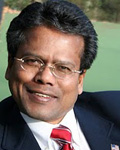|

When the U.S. Department of Justice announced its recent indictment against five members of the Chinese People's Liberation Army (PLA), the economic relationship between the United States and China effectively entered into "peaceful war" mode, which is now in the public domain.
This unprecedented 31-count criminal indictment involves corporate cyber-theft, cyber-espionage, and fraud by the PLA against leading U.S. companies. The question is: Will there be miscalculations that might launch a "cool," if not cold, war between these two intractably interdependent economic superpowers?
Unlike the Cold War period, in which the Soviet Union was isolated from the global economy, commercial interests and trade secrets seem to underpin the intrinsically entangled Sino-American economic relations. Now, globalization economics is the shadowy driver behind the political decision-making process.
For the Obama administration, traditional espionage on enemies and even friends for national security reasons is fair game. Spying is as old an institution as prostitution; for millennia, it was common to have a circle of spying eunuchs and concubines in China. Likewise, the United States—from the beginning of the Committee on Correspondence to the Office of Strategic Services, the predecessor to the Central Intelligence Agency—has had spying operations to protect the nation against potential domestic and foreign adversaries.
The Justice Department, however, differentiated the distinction between spying for national security and the alleged Chinese hacking of American corporations for commercial advantages. According to the Obama administration, the former is fair game; the latter is illegal.
With the revelations of Edward Snowden, Beijing has fittingly dismissed the nuanced American distinction. Snowden revealed that the U.S. National Security Agency (NSA) has infiltrated into Huawei Technologies, a hi-tech Chinese multinational company. A recent Foreign Policy article confirmed that an elite NSA ultra-secret China hacking group "successfully penetrated" Chinese computers and its telecommunication industry for the past 15 years.
Consequently, China swiftly condemned the American charges against the PLA operatives. Beijing retaliated to these indictments by cancelling the recently initiated cyber-security dialogue, which was just beginning to build mutual confidence and trust.
In all this, the public display by the Justice Department is widely perceived as a sign of American weakness by the Chinese. For them, it was a classic public relations maneuver of an unpopular Obama in the midterm elections. U.S. President Barack Obama's rhetoric and conflicting messages to its allies and friends in the East China Sea and the South China Sea are viewed as ambiguous and misguided. Beijing likely interprets this as a twisted kind of "speak softly, and carry a big stick" diplomacy that was championed by President Theodore Roosevelt. Obama speaks eloquently of cooperation but nevertheless deploys military forces to disputed maritime regions.
Beijing consistently demands that the United States should be an equal partner. When President Xi Jinping introduced his concept of "new type of major country relations," the Chinese leader may not have imagined acting in a global public square with accusations and counter-accusations.
The higgledy-piggledy distinction between national security and corporate interests is hardly convincing to the Chinese, especially when revolving doors in the United States conveniently inhabit the space between government service and corporations during both Democratic and Republican administrations. Just like Sino-American relations in commercial dialogue, economics triumphs over ideology in the partisan world of American politics.
In a rapidly changing world, a firm foundation of Confucian traditions and historic laurels has permitted the world's oldest continuous civilization to evolve and remain resilient. Sino-Russian energy and political ties, for example, underscore perceptions of declining American geostrategic power in Eurasia, the Middle East, and Eastern Europe. The growing U.S. national debt and shrinking federal budget allocation, especially for defense expenditures, contribute to the perception of declining American might in parallel with a diminished moral authority and prestige after more than a decade of costly wars in Iraq and Afghanistan.
This perception of declining American power is, however, misplaced. The U.S. armed forces have the power to deploy its expeditionary forces to every corner of the world within a 24-hour period. Neither China nor Russia has the will or even the desire to project this kind of global force—at least in the near future.
Does this omnipotent power really matter? President Obama said that "I have this remarkable title right now—president of the United States," but he admitted that his determination to use the levers of American power (referring to Crimea, Nigeria, Syria and elsewhere) is limited. However, the mere existence of that power as a presidential choice is itself deterrence.
In the end, neither the superior capabilities of one nation nor another nation's glorious past matters. What matters is a shared future. Surely there will be human conflicts, political disagreements, and military miscalculations. But by making this distinction between national security and corporate espionage to China, the Obama administration sent a tortuous message to the world.
The writer is a senior fellow and affiliate professor of public and international affairs at George Mason University's School of Public Policy and a commissioner of the U.S. National Commission for UNESCO. He is the author of Peaceful War: How the Chinese Dream and the American Destiny Create a Pacific New World Order
Email us at: yanwei@bjreview.com | 